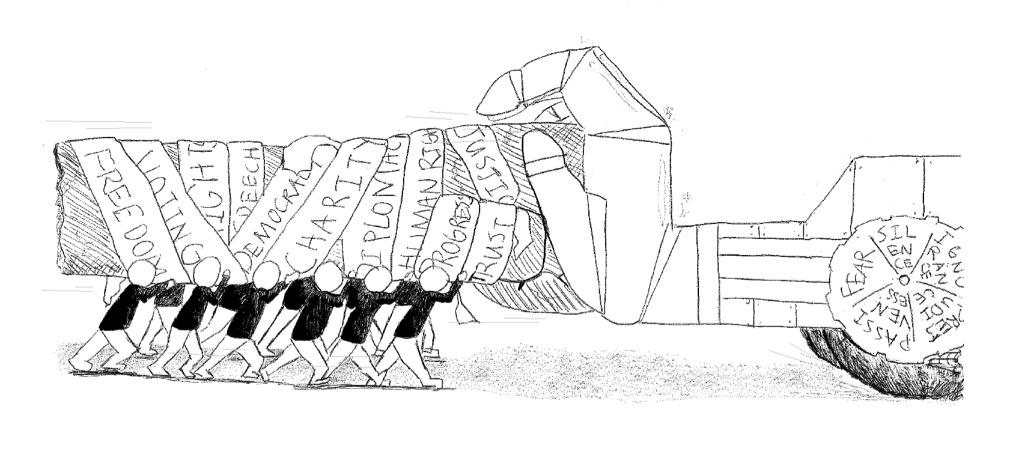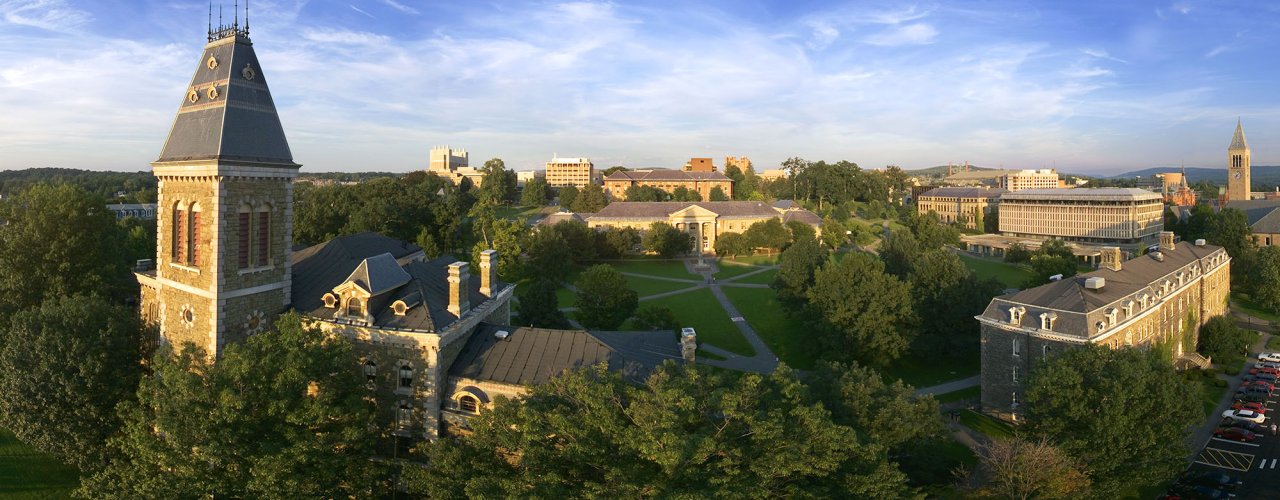Student Voices on Global Grand Challenges
Learn what students are thinking about Cornell University's responsibilities in improving the world.

Honorable mention recipient: “The Power for Progression” by Carissa Kwan, Class of 2019, College of Agriculture and Life Sciences
The Competition
Part of the Global Grand Challenges Symposium, sponsored by the Office of the Vice Provost for International Affairs, was the "Cornell Global Grand Challenge" competition. Students were invited to identify, in 300 words or less, the greatest challenge facing humanity today, and suggest how Cornell might contribute to addressing it.
The Co-Winners
Qingyi Gong, graduate student, East Asian studies: “On the Demise of Broad Learning”
Nicole Nomura, graduate student, landscape architecture: “No Dialogue, No Peace”
Abbey Yatsko, Class of 2020, College of Agriculture and Life Sciences: “Flavors of Change”
The Winning Entries
“On the Demise of Broad Learning” by Qingyi Gong
A conducive environment for broad learning is rarely found in colleges and universities in the world today.
As the amount of knowledge grows exponentially, the phenomenon of "knowledge explosion" often leads to unforeseeable consequences. One salient effect is the infinite division of academic subjects and a "mad race" in academia for specialization.
If we look at the homepages of most professors, we’ll sense what research looks like today. Academic specialization is so prevalent that some topics are pursued only by one or two scholars in a whole field.
Similar to professors, students focus on one or two subjects. In top universities like Cornell, the coursework required in a student’s major can be so much that students typically do not have the extra energy and time to explore other subjects of their interest.
To me, it is lamentable that rarely in today's universities do we find encyclopedic figures such as Su Shih and Leonardo da Vinci. While it is possible that well-rounded geniuses are lurking somewhere, one thing seems real: academic specialization sometimes limits a student’s ability to fully tap into her academic potential.
What I find at Cornell is that graduate students from different departments do not often communicate. Intra-departmental activities such as happy hours and colloquiums do not actually encourage inter-departmental communication. They tend to confine us within our specific departments. I sometimes imagine how cool it would be to know my fellow classmates studying physics or creative writing in Rockefeller Hall. How nice it would be to share a lunch with them!
The university provides few such opportunities—but Cornell definitely has a responsibility to address the problem in order to be a truly open-minded institution.
“No Dialogue, No Peace” by Nicole Nomura
Bigotry, nationalism, discrimination, judgment, racism, sexism, hate.
All of these are simply based on misunderstandings, but oh how deep they run through the blood in our veins, through the complex workings of our individual brains from when we took our first breath into this complicated world, to every moment we’ve heard, seen and felt. We’ve learned so well how to misunderstand.
The power of truth and words is now obscured. Sure, “freedom of speech.” Yes, constitutional rights. We can express ourselves all we want. Argue, point our fingers, kick, scream, holler—and shoot.
We look at everything about a person except their humanity. “But they believe in _______!” “But they don’t support _______!” “But they look like _______!”
The most basic common thread that runs through all of us is the most commonly broken. We have become blind through the smoke and mirrors.
The greatest challenge facing humanity today is our lack of perceiving humanity. What will it take to actually listen to others the way we listen to our sisters, our brothers, our friends? No need to agree. No need to disagree. No need for debates, winners or losers.
Dialogue is what holds the power for change and young people must take the lead.
Youth: it is our mission to rise up with courage to take on tomorrow. There is no tomorrow with bigotry, nationalism, discrimination, judgment, racism, sexism, hate.
The deepest strength and unification we need comes from understanding. Understanding comes from dialogue, dialogue comes from courage, courage comes from compassion, and compassion comes from a change of heart.
As Daisaku Ikeda once said, “A great human revolution in just a single individual will help achieve a change in the destiny of a nation and, further, will enable a change in the destiny of all humankind.”
“Flavors of Change” by Abbey Yatsko
Every day, we lead a life that is dependent on the health and stability of our surroundings, on both a local and on a global scale.
Take your morning cup of coffee: is this really a world-wide matter? The beans may be grown in Columbia. What about the cream? If you are lucky, perhaps it came from Cornell dairy cows. As for the sugar, maybe it was imported from the distant tropical climates of Southeast Asia.
Even when we consider something as miniscule as a cup of coffee, our worlds become linked. Your morning coffee is dependent on agriculture and crop cultivation. It relies upon trade relations and resiliency of governments. Of course, factors like predictable weather and farmer security contribute positively to the mix.
The stability of the environment reflects the stability of humankind. Global, human-derived climate change is a threat to this natural equilibrium that has slowly teetered out of balance. To compare the magnitude of such a problem to a cup of coffee does not do climate change any justice. Yet, it is a place to begin envisioning the connectedness and urgency of the issue at hand.
Are the consequences of climate change poised as unfathomable because we cannot truly process the result, or because we are too afraid to do so?
Institutions of higher education have the capacity to understand these enormous ideas and complex systems. They need to be bold and answer to these calls of challenge, reflecting the changes we need to see in the world through their own practices.
It would be a tall order to sustainably manage every element that went into a cup of coffee. Yet if we want to keep drinking it, we must take the responsibility to directly contribute to some flavor of change.

